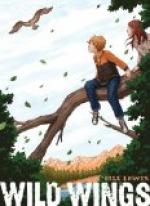“For there is a flame that has blown
too near,
And there is a name that has grown too dear,
And there is a fear.
And to the still hills and cool earth and far sky
I make moan. The heart in my bosom is not my
own! Oh, would I were free as the wind on wing!
Love is a terrible thing!”
Tony laid the book face down upon the table, still open at the little verse. The shadows were growing long out there in the dusk. The late afternoon sun was pale honey color. A soft little breeze stirred the branches of a weeping willow tree and set them to swaying languorously. Unseen birds twittered happily among the shrubbery. A golden butterfly poised for a moment above the white holly hocks and then drifted off over the flaming scarlet poppies and was lost to sight.
It was all so beautiful, so serene. She felt that it should have come like a benediction, cooling the fever of her tired mind, but it did not. It could not even drive the words of the poem out of her head.
Oh, would I were free as the wind on wing!
Love is a terrible thing!
CHAPTER XIII
BITTER FRUIT
From the North Station in Boston Alan Massey directed his course to a small cigar store on Atlantic Avenue. A black eyed Italian lad in attendance behind the counter looked up as he entered and surveyed him with grave scrutiny.
“I am Mr. Massey,” announced Alan. “Mr. Roberts is expecting me. I wired.”
“Jim’s sick,” said the boy briefly.
“I am sorry. I hope he is not too sick to see me.”
“Naw, he’ll see you. He wants to.” The speaker motioned Alan to follow him to the rear of the store. Together they mounted some narrow stairs, passed through a hallway and into a bedroom, a disorderly, dingy, obviously man-kept affair. On the bed lay a large framed, exceedingly ugly looking man. His flesh was yellow and sagged loosely away from his big bones. The impression he gave was one of huge animal bulk, shriveling away in an unlovely manner, getting ready to disintegrate entirely. The man was sick undoubtedly. Possibly dying. He looked it.
The door shut with a soft click. The two men were alone.
“Hello, Jim.” Alan approached the bed. “Bad as this? I am sorry.” He spoke with the careless, easy friendliness he could assume when it suited him.
The man grinned, faintly, ironically. The grin did not lessen the ugliness of his face, rather accentuated it.
“It’s not so bad,” he drawled. “Nothing but death and what’s that? I don’t suffer much—not now. It’s cancer, keeps gnawing away like a rat in the wall. By and by it will get up to my heart and then it’s good-by Jim. I shan’t care. What’s life good for that a chap should cling to it like a barnacle on a rock?”
“We do though,” said Alan Massey.
“Oh, yes, we do. It’s the way we’re made. We are always clinging to something, good or bad. Life, love, home, drink, power, money! Always something we are ready to sell our souls to get or keep. With you and me it was money. You sold your soul to me to keep money and I took it to get money.”




